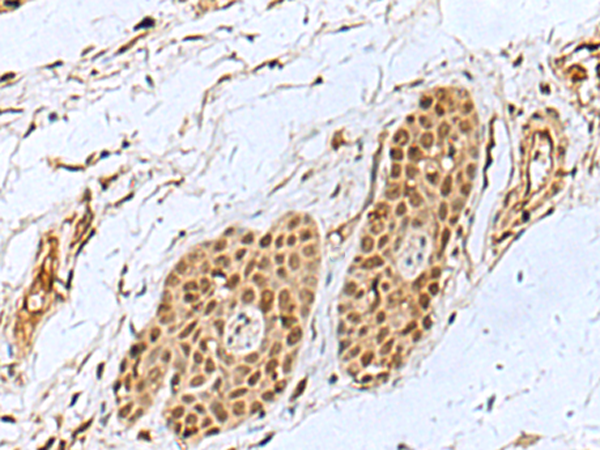
| WB | 咨询技术 | Human,Mouse,Rat |
| IF | 咨询技术 | Human,Mouse,Rat |
| IHC | 1/50-1/100 | Human,Mouse,Rat |
| ICC | 技术咨询 | Human,Mouse,Rat |
| FCM | 咨询技术 | Human,Mouse,Rat |
| Elisa | 1/5000-1/10000 | Human,Mouse,Rat |
| Aliases | WHIP; bA420G6.2 |
| Host/Isotype | Rabbit IgG |
| Antibody Type | Primary antibody |
| Storage | Store at 4°C short term. Aliquot and store at -20°C long term. Avoid freeze/thaw cycles. |
| Species Reactivity | Human, Mouse, Rat |
| Immunogen | Synthetic peptide of human WRNIP1 |
| Formulation | Purified antibody in PBS with 0.05% sodium azide and 50% glycerol. |
+ +
以下是关于WRNIP1抗体的3篇文献摘要信息,供参考:
---
1. **文献名称**: *WRNIP1 protects stalled replication forks in ALT cancers by facilitating fork restart*
**作者**: Higa M, et al.
**摘要**: 本研究通过WRNIP1特异性抗体进行免疫沉淀和免疫荧光实验,发现WRNIP1在ALT(端粒延长替代机制)相关癌症中通过结合停滞的复制叉,促进复制重启,维持基因组稳定性。研究揭示了WRNIP1在复制压力应答中的关键作用。
---
2. **文献名称**: *Interaction of WRNIP1 with proliferating cell nuclear antigen regulates DNA polymerase η recruitment*
**作者**: Yoshimura A, et al.
**摘要**: 作者利用WRNIP1抗体进行共免疫沉淀和蛋白质互作分析,证明WRNIP1通过与PCNA结合,调控DNA聚合酶η(Polη)在DNA损伤位点的招募,进而影响跨损伤合成(TLS)修复机制。
---
3. **文献名称**: *WRNIP1 controls the formation of UV-induced replication foci in a manner dependent on its ATPase activity*
**作者**: Kanoh Y, et al.
**摘要**: 研究通过Western blot和免疫细胞化学技术(使用WRNIP1抗体)发现,WRNIP1的ATP酶活性是其调控紫外线(UV)诱导的复制灶形成的关键,其缺失会导致复制叉崩溃并增加DNA损伤敏感性。
---
如需具体文献来源或补充更多内容,可进一步说明!
The WRNIP1 (Werner helicase-interacting protein 1) antibody is a research tool used to study the function and expression of the WRNIP1 protein, which plays a role in maintaining genome stability and DNA replication processes. WRNIP1 interacts with Werner syndrome ATP-dependent helicase (WRN), a protein critical for DNA repair, replication, and telomere maintenance. Mutations in WRN are linked to Werner syndrome, a premature aging disorder. WRNIP1 is believed to assist WRN in resolving replication stress by stabilizing stalled replication forks and facilitating the restart of DNA synthesis, though its precise mechanisms remain under investigation.
Antibodies targeting WRNIP1 are primarily utilized in molecular biology and cancer research to detect protein expression levels, localization, and interactions via techniques like Western blotting, immunofluorescence, and immunoprecipitation. Studies suggest WRNIP1 overexpression in certain cancers may correlate with tumor progression or chemoresistance, highlighting its potential as a therapeutic target. Conversely, reduced WRNIP1 levels have been implicated in genomic instability, contributing to aging-related pathologies. Researchers also employ WRNIP1 antibodies to explore its interplay with other replication-associated proteins, such as PCNA and DNA polymerases, to elucidate its role in replication fork dynamics. Despite progress, further studies are needed to fully characterize its regulatory pathways and clinical relevance.
×